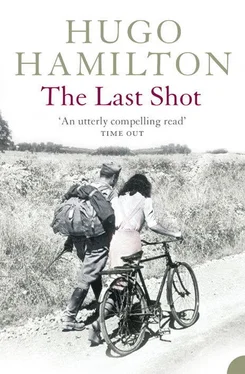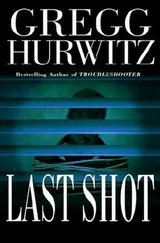Hugo Hamilton
THE LAST SHOT
At 7.15 a.m. Bertha Sommer walked down the road from the main German garrison towards the town of Laun. She was on her way to the church of St Nicholas, where she would attend Mass, something she was determined not to miss no matter what events would take place on that day. ‘No matter how close the Russians are,’ she said to herself defiantly. It was a clear May morning: May 1945. The relentless rain of the night before had stopped, and even though banks of cloud still hung over the eastern sky, there was a feeling that the weather would change. An intuition of summer.
She was accompanied by an officer named Franz Kern whose noisy boots sometimes obscured the sound of her own footsteps. He was with her for her own protection. Her escort. The roads of Bohemia were no longer safe. And as they walked down the hill, the town of Laun was frozen below them in a patient immobility, blue woodsmoke rising above the roofs in the distance like a symbol of static hostility. The Czechs knew their day of freedom would come soon, but the feeling was tinged with the innate provincial fear which has clung to this small town ever since; the fear of being left behind by history. Time moves on, towns don’t.
The road was loud with birdsong. There was little to talk about as they walked. Bertha Sommer knew Officer Kern from the office where they saw each other regularly, though they seldom talked about anything other than official matters. Outside the office, there was nothing to say. In May 1945 there was so much on everybody’s mind. So much you couldn’t talk about. Or maybe it was the sheer volume of things to say that forced them instead to speak about nothing but the rain.
‘It kept me awake,’ she said openly. ‘I thought it would never end.’
Bertha was sure she had already said too much. It was followed by the silence along the road; their footsteps, the hysterical noise of birds and, somewhere in the distance, the familiar hoarse bark of a dog she had often heard before at this point on the road, but never actually seen. The rain had unleashed the fresh damp smell of the soil. It merged with the smell of exhaust left behind by military trucks.
In the small Bohemian town of Laun, where this story begins, somewhere almost halfway between Prague and Dresden, it was impossible to pretend that everything went on as normal. Europe was in ruins. Hitler was dead. There wasn’t much left of Dresden. The smell of Russian cigarettes came from the east, where the Red Army stood somewhere between Brno and Jih-lava, advancing at a rate of eighty kilometres per day. The smell of Camel cigarettes was even closer, drifting up from Pilsen in the south, where the Americans had stopped, having consented by nodding agreement that the liberation of Czechoslovakia belonged to the Russians. It was a matter of waiting. The radio stations coming from Dresden and from Prague went on broadcasting German march music. Occasionally you heard German swing. Mostly it was waltz music. The Reich was waltzing to an end.
The resistance movement in Czechoslovakia had planned their nationwide insurrection for that day. Everything was set for the liberation of Prague, the only European capital left under occupation. But the Reich held fast. There was talk of fighting to the last man. Orders were given by General Schörner in command of the German Army on the Eastern Front that any German soldier caught deserting or attempting to flee should be hanged on the spot. They were already dangling from the trees elsewhere, in Prussia. In defeat, the army hangs its own.
What everybody really wanted was to go home. The whole of Europe was thinking about home, or what was left of it. Bertha Sommer thought about Kempen, a small town no larger than Laun, but over 1,000 kilometres to the west, in the Rhineland. Officer Kern thought about Nuremberg, or what was left of it. Going home wasn’t that simple. Not so easy to end a war. A war is only over when the last shot has been fired, and who knows where the last shot of the Second World War was fired?
Back in April, when all German civilians were finally allowed to evacuate from the Czech protectorate back to German soil, the commander of the garrison at Laun issued a directive confining the remaining civilian backup personnel to barracks for their own safety. It could only have been intended for one person. Bertha Sommer. She was the last person left at the garrison of 2,000 infantry men of the 213th Battalion who could be described under this directive. She began to plead with Hauptmann Selders to be exempted. She was determined to go to Mass throughout the month of May. It was that important to her. Hauptmann Selders said he would hate to lose his last secretarial assistant to a partisan bullet along the open roads. But he was flexible and eventually changed the directive. From now on, he decreed that civilian backup personnel had to travel in armoured cars, until he reflected on the fuel shortages and changed his mind again; they had to be accompanied by an armed soldier. He put it in writing. She typed it up. Officer Franz Kern volunteered.
Bertha Sommer wore a three-quarter-length russet coat. In the early morning light along the road down to Laun, Officer Kern would have thought the colour of the coat leaned more towards burgundy or wine. But the exact colour of her coat had always been a matter of some dispute, ever since she bought it in Paris. Her own mother called it copper. The inhabitants of Laun, who were convinced that she was sent to the St Nicholas church to spy on them, said the coat was fox-red, or fox-brown.
Bertha Sommer walked briskly. Perhaps it was her shyness. She began to count her own footsteps. She idly measured the distance to the next building in footsteps; the first small house on the outskirts of the town.
‘Fräulein Sommer.’ Officer Kern addressed her quite abruptly. ‘Do you realize how close we are to the end?’
‘What do you mean?’ She was trying to read the implication.
‘It’s over. The Reich is finished. You have seen all the reports. It may not even last the day. Do you realize what this means for you?’
‘Yes and no.’
Occasionally their footsteps fell into unison, causing a slight embarrassment between them until her faster steps doubled his once more.
‘Fräulein Sommer, have you any idea how close we are to Russian captivity? For your sake, Fräulein Sommer, I would avoid this at all cost. Above all people, I would hate to see you taken into Russian hands.’
‘What are you suggesting?’ she said.
There was another moment of raw embarrassment. He apologized for putting it so crudely but he felt he had to warn her. Even then, his open discussion of German defeat was enough to condemn him for treason. Enough to have him shot or hanged from the next tree. Now she began to wonder why he had volunteered to walk down to the town with her. His honesty scared her. She suspected it was a trick. Something to test her loyalty. You could trust nobody in the Reich. And yet, he was only saying what everyone had felt privately for months.
‘Between the two of us, Fräulein Sommer, I think we should get out of Laun as soon as possible. Things are going to get very bad around here. I may be able to arrange something, so I would ask you to be prepared. The sooner we set off back towards Eger, to the German border, the better.’
‘Herr Kern, are you talking about desertion?’
‘Fräulein Sommer, I wish you wouldn’t put it like that. You are a civilian in the service of the Wehrmacht, how can you desert? There is no point in your being here with the army to the bitter end.
‘And it’s going to be bitter, believe me. I hear everything that’s going on. It’s my job to listen to all radio signals. I know what’s going to happen here when the Russians arrive. Very briefly, Fräulein Sommer, I have a simple plan to get you back to Germany. I may be able to arrange it tonight. Think about it. Don’t give me an answer now. Let it go through your head. But whatever happens, I would advise you to be ready to leave at a moment’s notice.’
Читать дальше
Конец ознакомительного отрывка
Купить книгу












